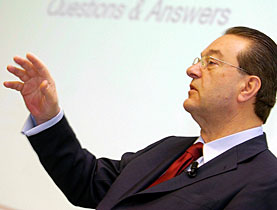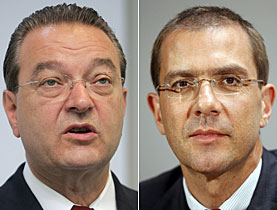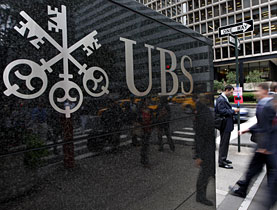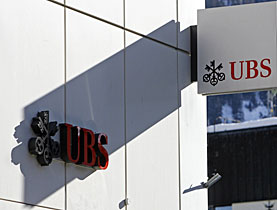Can Grübel repeat bank-saving trick at UBS?

Veteran banker Oswald Grübel earned a reputation as a magician when he turned around the fortunes of Credit Suisse but faces even greater challenges at rival UBS.
On Thursday, the share price of Switzerland’s largest bank shot up on the news that it had plucked Grübel out of retirement to replace Marcel Rohner as chief executive.
And most experts agreed that he is the right man for the job.
Shares closed trading up 16.24 per cent at SFr11.74 ($9.68).
Grübel takes over the helm of a bank on the ropes after a recent pummelling from both the global financial crisis and a United States tax evasion probe, which threatens to derail its flagship wealth management business.
UBS posted a record SFr20 billion loss last year, confirming it as Europe’s worst hit bank from the subprime meltdown. Last week, it was forced to hand over confidential client data to the US, compounding huge recent withdrawals from its wealthy clients.
The German banker, affectionately known as Ossie, faced a tough challenge when he became CEO of Credit Suisse in 2004. He rose to the occasion by restructuring and rebranding the bank and guiding it to record profits before retiring in 2006.
Strong character
The move to appoint Grübel was met with widespread approval in the markets and political circles. “With Grübel as the new CEO the bank can now restore confidence with investors, clients and regulators,” said Kepler Capital Markets analyst Dirk Becker.
“Grübel has the strength of character and banking knowledge to take charge at UBS and actually implement a strategy,” added Helvea analyst Peter Thorne.
But Martin Janssen, a professor at Zurich University’s Swiss Institute of Banking and Finance, said that UBS had far greater problems than Credit Suisse had five years ago.
“The situation is completely different. It is far tougher and much more complex. Nobody knows if Grübel can turn UBS around, but at least he is willing to try, he is experienced, he is credible and he is a good leader,” Janssen told swissinfo.
“He will probably do the most obvious things: getting rid of the risks, scaling down on size, reducing costs and concentrating on the core businesses, such as wealth management.”
Knives out
In an internal memo to UBS employees, Grübel said it would take two years to restore client confidence in the bank. Well-heeled customers withdrew some SFr58 billion from its wealth management and private banking businesses in the last three months of 2008 alone.
However, Janssen thinks it might take longer than that to bring the wealthy back into the fold. “If they manage to just stem the outflows from wealth management in that time it would be an incredible achievement,” he said.
Janssen also urged Grübel to build a stronger team to help him achieve the turnaround. Rohner had been highly criticised during his 18-month tenure as CEO and many knives are still out for chairman Peter Kurer.
“If you look at UBS in the last year then it is hard to observe any new strategy. Not really much has changed,” said Janssen.
UBS shareholders will have an opportunity to cast their views – and votes – on the bank’s leadership at the annual general meeting on April 15.
swissinfo, Matthew Allen in Zurich
UBS’s dramatic fall from grace started in July 2007, when chief executive Peter Wuffli stepped down following the collapse of the bank’s hedge fund Dillon Read Capital Management.
In October 2007, UBS said it would cut 1,500 jobs in its investment banking arm, including that of its head, Huw Jenkins. Chief Financial Officer Clive Standish left at the same time. Chairman Marcel Ospel stepped down in April 2008.
In October last year, the Swiss National Bank (SNB) was forced to inject SFr6 billion ($5.29 billion) into UBS. A facility was also set up to allow the bank to bin up to $60 billion of toxic assets.
This bailout did not prevent the bank from posting a SFr20 billion loss for 2008. Wealthy clients pulled out $58 billion from the bank in the last quarter alone.
UBS has also been haunted by a US investigation that accused the bank of helping wealthy Americans illegally evade $200 billion in taxes. Last week, it was forced to pay $780 million in fines and hand over some confidential client data.
But the deal has not completely satisfied the US tax authorities, who have demanded secret data on 52,000 further UBS clients.
Born in East Germany in 1943, Grübel, 65, played a key role in turning Credit Suisse around after it posted a SFr3 billion annual loss in 2002.
His policies were strongly criticised by his predecessor, Lukas Mühlemann, but Grübel led the bank to an SFr11 billion profit in 2006. But there were costs: thousands of employees lost their jobs.
Nicknamed “Ossie”, Grübel grew up an orphan. He began his banking career at Deutsche Bank, and moved to CS in 1970 by working for its investment offices in London, White Weld Securities. He became the CEO of that division in 1978.
Grübel continued to climb the corporate ladder by taking several high positions within the bank, namely at Credit Suisse First Boston. In 1991 he joined the executive board.
In 1998 he began serving as director of the bank’s private division and later at Credit Suisse Financial Services. After leaving briefly in 2001, he became the bank’s co-CEO and later assumed the helm in 2004. He stepped down in 2007.

In compliance with the JTI standards
More: SWI swissinfo.ch certified by the Journalism Trust Initiative




You can find an overview of ongoing debates with our journalists here. Please join us!
If you want to start a conversation about a topic raised in this article or want to report factual errors, email us at english@swissinfo.ch.